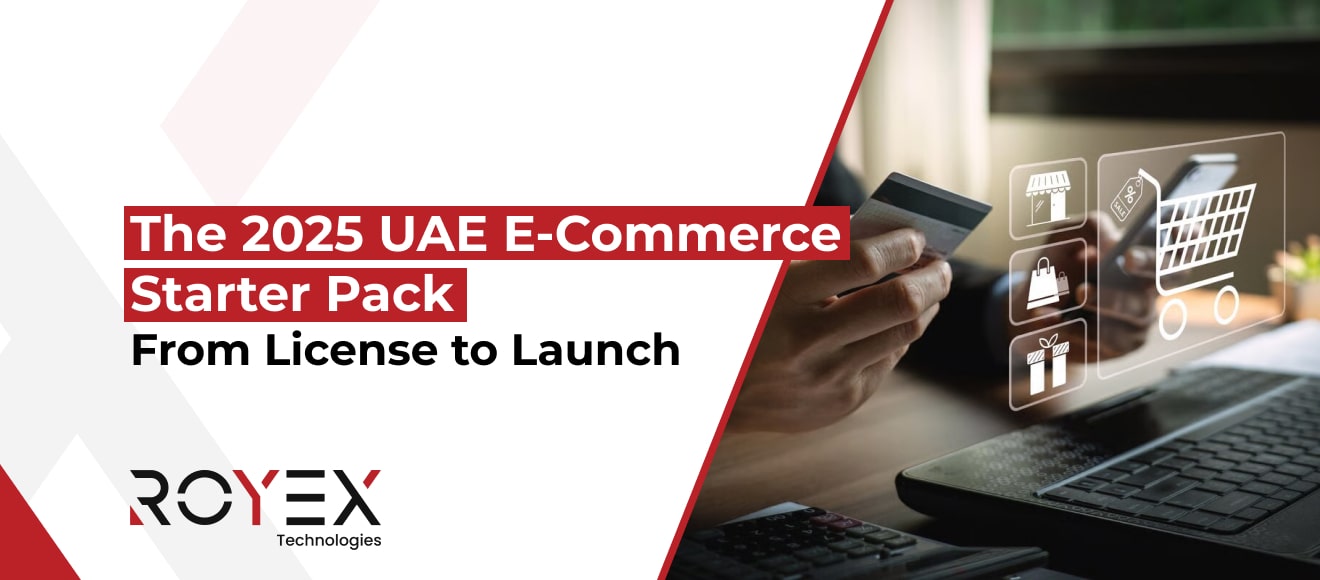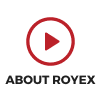
The 2025 UAE E-Commerce Starter Pack — From License to Launch
The UAE in 2025 is not just open for e-commerce — it’s accelerating. With ambitious national trade goals, a rapidly digitalizing population, and heavy investment in logistics and cloud infrastructure, the market presents enormous opportunity for founders who launch the right way. But opportunity without preparation is risk: the winners will be the merchants who combine local compliance, smart product strategy, rock-solid operations, and conversion-first digital experiences.
This guide is a practical, end-to-end starter pack for 2025: everything you need from legal setup to choosing technology, payments, shipping, marketing, and launch metrics — with UAE-specific numbers, operational checklists, and tactical tips you can act on today.
Market Snapshot — Why 2025 Is a Pivotal Year for UAE E-Commerce
The UAE e-commerce market reached AED 32.3 billion (USD 8.8 billion) in 2024 and is projected to exceed AED 50.6 billion by 2029 — driven by mobile adoption, marketplace dominance, and expanding logistics networks.
Key takeaways:
-
Demand exists, but competition is fierce.
-
Speed, localization (Arabic + English), and flexible payments are conversion drivers.
-
Logistics and last-mile speed are key differentiators — same-day and next-day delivery are now expected.
Quick Start Checklist — 12 Essentials Before Launch
-
Legal entity & e-commerce license (Free Zone or Mainland)
-
VAT registration if revenue > AED 375,000
-
Platform selection & mobile-first UX
-
Payment gateway and wallet integrations
-
Product sourcing and landed cost model
-
Fulfillment & warehouse strategy
-
Returns policy and reverse logistics
-
Marketing stack (SEO, paid, influencer)
-
Analytics & event tracking (GA4)
-
Customer support (WhatsApp & chatbots)
-
Data security & compliance (PCI DSS, GDPR)
-
Cashflow planning and break-even modeling
Legal & Company Setup — Free Zone vs Mainland, Licenses, VAT
Choosing Between Free Zone and Mainland
Free zones allow 100% foreign ownership, simplified setup, and tax incentives, making them ideal for export-oriented e-commerce. Mainland companies allow direct trade within the UAE, better for retail and B2B partnerships.
Getting the Right License
Your trade license must include e-commerce activity — issued either by a Free Zone Authority (like Dubai CommerCity, DMCC) or DED. This is mandatory for payment gateway activation and courier contracts.
VAT Registration
If your annual turnover exceeds AED 375,000, VAT registration is compulsory. The VAT rate is 5%, and failing to comply results in penalties. Always include VAT in pricing from day one.
Legal Essentials
-
Display Terms & Conditions, Returns Policy, and Privacy Policy.
-
Ensure supplier contracts cover liability and lead times.
-
Clarify Incoterms for imports (FOB, CIF) to manage risk and cost transfers.
Products & Supply — Picking SKUs, Sourcing, and Cost Modeling
Product Selection
Focus on a narrow but profitable range of products (10–50 SKUs) that can be marketed effectively and stocked reliably. Start small, test, and expand based on data.
Sourcing Strategies
-
Local suppliers: Fast, reliable, higher cost.
-
Regional suppliers (GCC, India, Turkey): Balanced cost and lead time.
-
International (China, EU): Low cost but longer logistics and customs delays.
Landed Cost Model
Account for:
-
Product cost (FOB/CIF)
-
Freight and customs fees
-
VAT (5%)
-
Warehouse & handling
-
Returns provisioning
Use a margin calculator spreadsheet before setting retail prices — your real profit is what remains after all variable costs.
Platform & Technology — Choosing the Right Stack in 2025
SaaS vs Open Source vs Custom
-
SaaS (Shopify, BigCommerce): Fast to launch, simple management.
-
Open Source (WooCommerce, Magento): Customizable, but requires maintenance.
-
Custom / Headless Commerce: Scalable, ideal for complex or enterprise-grade stores.
Choose based on your growth projections, complexity, and in-house tech capabilities.
Mobile-First Experience
Over 80% of UAE shoppers buy on mobile. Optimize page speed — aim for load times under 3 seconds. Use CDNs, lazy-loading, and image optimization for lightning-fast performance.
Localization
Offer both Arabic and English versions. Display AED pricing and support multiple currencies for cross-border customers.
Key Integrations
-
Local payment gateways
-
3PL and courier APIs
-
ERP and inventory sync
-
Email/SMS automation
-
Analytics and heatmap tools
Payments — Gateways, Wallets, BNPL, and Fraud Management
Payment Landscape
Digital payments are the dominant mode of transaction, with card usage and mobile wallets growing rapidly. Cash on Delivery is declining but still significant for first-time buyers.
Top Payment Gateways
-
Network International
-
Checkout.com
-
PayTabs
-
Telr
-
Amazon Payment Services (PayFort)
Wallets and BNPL
Offer Apple Pay, Google Pay, and local wallets. “Buy Now Pay Later” (BNPL) services like Tabby and Tamara boost AOV but reduce margins slightly due to fees.
Fraud and COD Controls
-
Limit COD for new customers.
-
Use OTP verification for deliveries.
-
Employ fraud detection software and IP analysis to reduce chargebacks.
Fulfillment & Logistics — Mastering the Last Mile
Delivery Speed as a Differentiator
Same-day and next-day delivery are now standard expectations. Partner with logistics providers offering real-time tracking and delivery notifications.
Fulfillment Options
-
In-House: Full control, higher fixed costs.
-
3PL (Third-Party Logistics): Flexible, scalable.
-
Marketplace Fulfillment: Amazon or Noon fulfillment can help scale fast.
Returns Management
A good returns process builds trust.
-
Define return periods (7–30 days).
-
Offer prepaid labels for high-value customers.
-
Track return rates per SKU and optimize based on performance.
Marketplace Strategy — Balancing Visibility and Control
Marketplaces like Noon, Amazon.ae, and Carrefour capture massive UAE consumer attention.
Smart Approach
-
Use marketplaces for exposure and testing demand.
-
Direct marketplace customers to your own D2C site with incentives.
-
Keep an eye on fees — often 10–25% of sale price.
A hybrid model (marketplace + D2C) ensures visibility without dependency.
Launch Marketing — Building Momentum from Day One
Pre-Launch
-
Create a coming-soon landing page.
-
Use micro-influencers to create buzz.
-
Start SEO efforts early — write localized product content.
Launch Phase
-
Run hyper-targeted ads on Meta, Google, and TikTok.
-
Send email campaigns and retarget visitors.
-
Use SMS for flash sales and cart recovery.
Post-Launch
-
Launch loyalty and referral programs.
-
Collect and display reviews and UGC.
-
Refine ad campaigns based on CAC and ROAS metrics.
SEO & Content — Your Long-Term Growth Engine
Content Focus
Target high-intent local keywords (e.g., “best smartwatches in UAE”).
Include buyer guides, how-to posts, and reviews in both English and Arabic.
Technical SEO
-
Implement product schema.
-
Use hreflang for bilingual sites.
-
Optimize site speed and mobile UX.
-
Submit XML sitemaps to Google Search Console.
Organic visibility reduces paid dependency and improves brand authority over time.
Customer Experience — Service, Trust, and Retention
Multichannel Support
UAE shoppers expect instant responses. Offer WhatsApp, live chat, and phone support.
Policies that Build Trust
Display clear shipping times, return windows, and warranty coverage. Transparency increases conversions.
Loyalty and Subscriptions
Encourage repeat purchases through subscription options and reward programs. Aim for a 20% repeat purchase rate within 6 months.
Analytics, KPIs & Financial Modeling — Data-Driven Decisions
Track key metrics from the start:
Core KPIs
-
Revenue and Orders per day
-
Conversion Rate
-
AOV (Average Order Value)
-
CAC (Customer Acquisition Cost)
-
LTV (Lifetime Value)
-
Return Rate
Financial Metrics
-
Gross Margin = (Revenue − COGS) / Revenue
-
Contribution Margin = Price − (Variable Costs)
-
LTV:CAC Ratio ≥ 3:1
Implement GA4, heatmaps, and dashboard reporting to spot trends quickly.
Regulatory & Compliance — Stay Legit, Stay Trusted
Data Protection
Follow UAE privacy laws and align with GDPR standards when serving EU customers. Encrypt personal data and use SSL everywhere.
Consumer Protection
Display accurate prices (with VAT), detailed product info, and clear refund policies.
Export and Cross-Border Rules
Use the right Incoterms (FOB, DDP, etc.), and automate customs documentation for overseas sales.
Operations & Team — Who You’ll Need
For a lean but effective e-commerce operation:
-
Operations Manager: Handles logistics and warehousing.
-
Marketing Manager: Runs campaigns and analytics.
-
Product Manager: Manages SKUs, pricing, and listings.
-
Customer Support Lead: Ensures satisfaction.
-
Finance Executive: Manages VAT, payments, and reporting.
Outsource non-core tasks like design or bookkeeping to stay agile.
Costs & ROI — Setting Realistic Expectations
Setup Costs (Estimated):
-
Platform & Development: AED 20K–200K
-
Hosting & SaaS: AED 500–5,000/month
-
Inventory: AED 50K–500K
-
Marketing: AED 10K–100K
-
Fulfillment: AED 2–25/order
Payback Period:
Typically 6–12 months if CAC is optimized and retention programs work.
Risks & Mitigation — Avoiding Common Pitfalls
| Risk | Mitigation |
|---|---|
| Rising acquisition costs | Invest in SEO, content, and owned media early |
| Fulfillment delays | Partner with multiple 3PLs |
| Regulatory updates | Keep a compliance consultant |
| Currency fluctuation | Prefer AED settlement and hedging |
90-Day Launch Playbook
Days 0–30:
-
Register company & e-commerce license
-
Complete VAT setup
-
Create landing page and build supplier contracts
Days 31–60:
-
Build platform and integrate payment gateways
-
Set up email and analytics automation
Days 61–90:
-
Launch campaigns
-
Monitor unit economics daily
-
Collect reviews and optimize listings
2025 Trends You Must Plan For
-
Ultra-Fast Delivery (same-day, 2-hour delivery zones).
-
Widespread Wallet Usage and lower transaction fees.
-
AI Personalization for dynamic recommendations.
-
Marketplace Consolidation — Noon and Amazon dominate, so build D2C resilience.
Why Choose Royex for E-Commerce Development
Launching in the UAE demands a partner who understands not just technology, but local compliance, payments, and performance. That’s where Royex Technologies stands out.
What Royex Offers
-
End-to-End E-Commerce Development: Shopify, Magento, custom, and headless builds.
-
Integration Expertise: Payments, logistics, and 3PL APIs built for the UAE market.
-
Compliance Setup: VAT-ready invoicing and secure data handling.
-
Performance & Analytics: GA4 integration, dashboards, and experimentation.
-
Growth Enablement: SEO, Arabic localization, influencer strategies, and conversion optimization.
Proven Success
Royex clients enjoy faster load times, improved conversions, and strong local presence. With 12+ years in the UAE and 500+ successful e-commerce projects, Royex transforms your idea from license to launch — and scales it sustainably.
Established in 2013, Royex Technologies is a leading E-Commerce Web Design Company in Dubai that provides innovative solutions for small, medium, and large-scale companies. We specialize in responsive web development, mobile app development, CRM integration, AI solutions for website & mobile applications, and many more. Our extensive experience in mobile app development will help you to take your business to a high level.
Conclusion — Launch Smart, Scale Sustainably
The UAE’s 2025 e-commerce landscape rewards those who plan meticulously and execute fast. By aligning your legal, technical, and marketing foundations — and by partnering with experts like Royex Technologies — your store can go from concept to a profitable, scalable business in record time.





